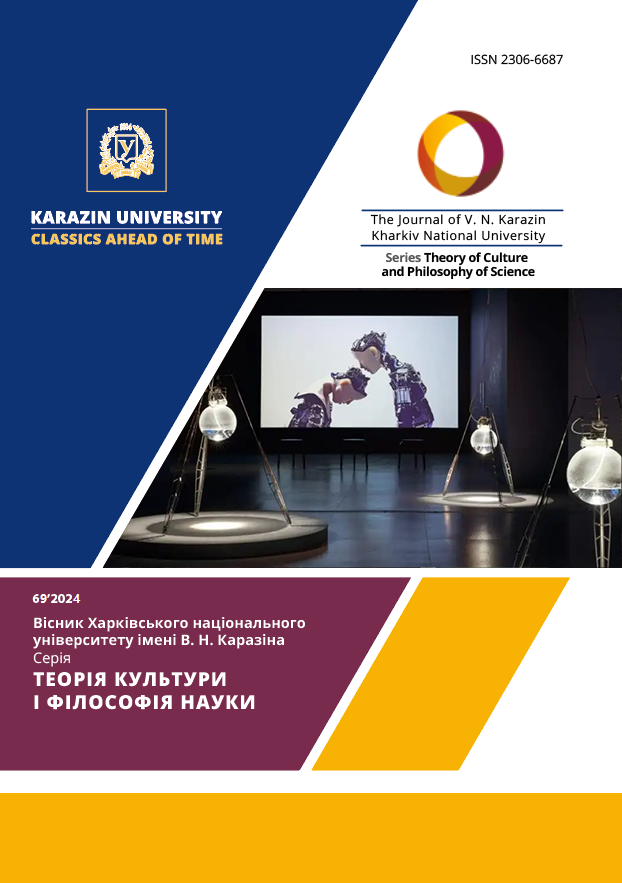THE HERMENEUTICAL ASPECT OF RHETORIC
Abstract
The article provides a comprehensive theoretical and methodological analysis of the evolution and transformation of rhetoric’s status in contemporary sociocultural discourse. The authors focus on rethinking the traditional understanding of rhetoric as purely the art of oratory and conceptualizing it as a multidimensional phenomenon that plays a fundamental role in personality formation and effective communicative interaction in modern society. The research is based on a historical-philosophical analysis of the etymology and evolution of the concept of "rhetoric" through the lens of the opposition of three key ancient approaches: the Sophistic, the Socratic-Platonic, and the Aristotelian. This methodological triangulation allows for the identification of the deep ontological, hermeneutic, and epistemological foundations of rhetoric as a sociocultural phenomenon. Particular attention in the study is given to the issue of conceptualizing the modern status of rhetoric in the context of its growing commercialization. The authors critically analyze traditional limitations regarding the application of rhetoric exclusively to literary language and justify the necessity of expanding its functional scope to other forms of natural language and communication. A fundamentally important aspect of the study is the exploration of the hermeneutic dimension of rhetoric, which extends far beyond the classical dichotomy of the real and the imaginary. The authors demonstrate how rhetorical practices participate in constructing social reality through the formation of discursive structures and influence the production of knowledge and truth within the context of power relations. The study substantiates the thesis that modern rhetoric emerges as a complex sociocultural mechanism that not only ensures effective communication but also actively participates in the processes of social reality construction, the formation of worldviews, and the development of personal value orientations. This enables rhetoric to be considered an essential instrument of social engineering and cultural transformation. The research also highlights the significance of rhetoric in the development of critical thinking and communicative competence in the context of the modern information society. A special emphasis in the article is placed on the hermeneutic function of rhetoric, which lies in its ability to interpret and analyze texts, revealing their deep meaning and significance. The authors argue that hermeneutic rhetoric is not only a tool for understanding others' thoughts but also a means of self-knowledge and the formation of one's own worldview. It enables individuals to critically rethink cultural traditions, social norms, and ideological constructs, fostering the development of autonomous thinking and independent judgment. Hermeneutic rhetoric also plays a crucial role in intercultural communication, facilitating understanding between representatives of different cultures and helping to overcome cultural barriers. This study makes a significant contribution to understanding the contemporary status of rhetoric as a multidimensional sociocultural phenomenon that goes far beyond the traditional understanding of oratory and emerges as a fundamental mechanism for constructing social reality and shaping personality within the modern communicative space.
Downloads
References
Albrecht-Crane, C. (2015) Understanding Rhetoric: A Graphic Guide to Writing by Elizabeth Losh et al. (review). Rocky Mountain Review of Language and Literature, 69, 104-107.
Aristotle. (1991) On Rhetoric: A Theory of Civic Discourse / Aristotle, G. Kennedy // Oxford University Press.
Bengtson, Erik. (2024) The Epistemology of Rhetoric: Plato, Doxa and Post-Truth. Windsor, ON: Windsor Studies in Argumentation. 254 s.
Boyle, C. (2018) The Digital: Rhetoric Behind and Beyond the Screen / Boyle Casey, Brown James J., Ceraso Steph. Rhetoric Society Quarterly, 48, 251-259.
Eyman D. (2015) Digital Rhetoric: Theory, Method, Practice. Ann Arbor: University of Michigan Press. pp. 52–60.
Fuller, Steve, and James H. Collier. (2004) Philosophy, Rhetoric, and the End of Knowledge: A New Beginning for Science and Technology Studies. 2nd ed. Mahwah, NJ: Lawrence Erlbaum Associates Publishers.
Gadamer, Hans-Georg. Rhetorik und Hermeneutik. (1993) In: Gadamer, Hans-Georg. Wahrheit und Methode. Grundzüge einer philosophischen Hermeneutik. Band 2: Hermeneutik II. Tübingen: Mohr Siebeck. S. 248-261.
Hodgson, J., Barnett, S. (2016) Introduction: What is Rhetorical about Digital Rhetoric? Perspectives and Definitions of Digital Rhetoric. Enculturation, November, 22, 2016. URL: https://enculturation.net/what-is-rhetorical-about-digital-rhetoric.
Jenkins, E. S. (2021). Rhetoric is dead? The fear of stasis behind post-truth rhetoric. Philosophy & Rhetoric, 57(2), 166–189. https://doi.org/10.5325/philrhet.57.2.0166
Kunitz, Stephen J., and Jerrold E. Levy. (1997) Rhetoric and Hermeneutics in Our Time. New Haven: Yale University Press.
Plato. Gorgias. Translated by B. Jowett. Chicago: (1989) University of Chicago Press.
Plato. Phaedrus. Translated by B. Jowett. (1997) New York: Dover Publications.
Plato. The Republic. Translated by G. M. A. Grube, revised by C. D. C. Reeve. (2016) Indianapolis: Hackett Publishing Company.
Poulakos J. (1990) Interpreting Sophistical Rhetoric: A Response to Schiappa // Philosophy and Rhetoric. No. 23. P. 218–228.
Quintilian. (2002) The Orator's Education. Translated by W. M. Smail. Loeb Classical Library. https://www.loebclassics.com/view/quintilian-orators_education/2002/pb_LCL124.367.xml.
Schiappa E. (1990) Did Plato Coin Rhetorike? // American Journal of Philology, No. 111. P. 457–470.
Schiappa E. (1990) Neo-Sophistic Rhetorical Criticism or the Historical Reconstruction of Sophistic Doctrines? // Philosophy and Rhetoric, No. 23. P. 192–217.
Walker, Jeffrey. (2011) The Genuine Teachers of this Art: Rhetorical Education in Antiquity. Columbia: University of South Carolina Press. Print.
Wallace, J. (2019). Rhetorical hesitancy. Philosophy & Rhetoric, 55(1), 119–142. https://doi.org/10.5325/philrhet.55.1.0119
Walzer, B. (2020). A rhetoric of everyday violence: Embodied slow violence. Philosophy & Rhetoric, 56(3-4), 37–60. https://doi.org/10.5325/philrhet.56.3-4.037




